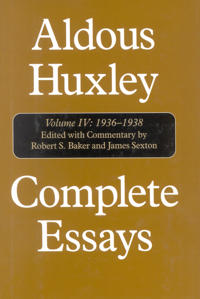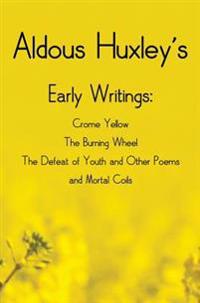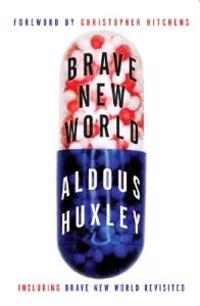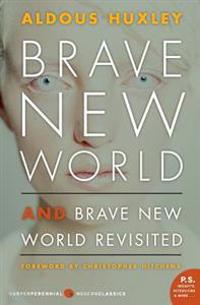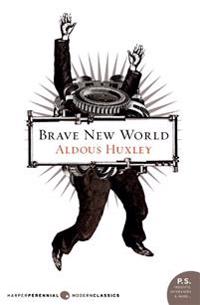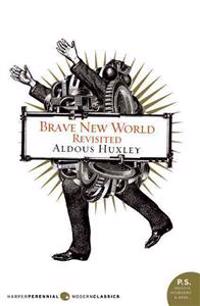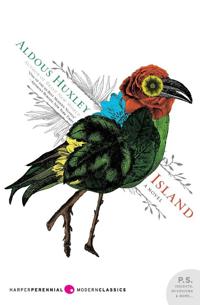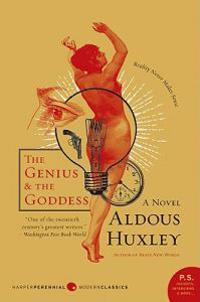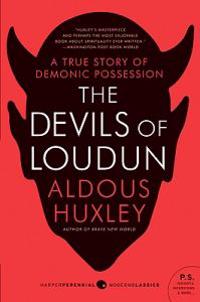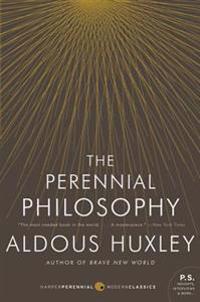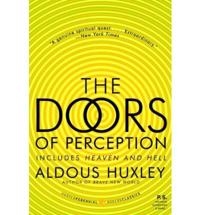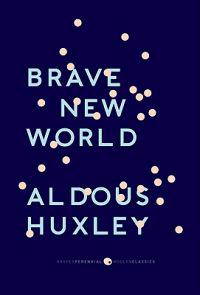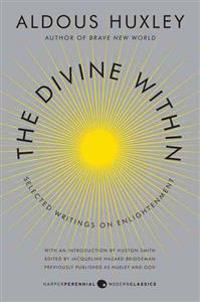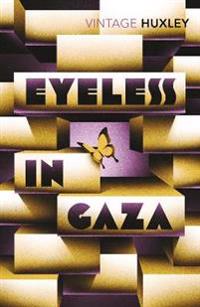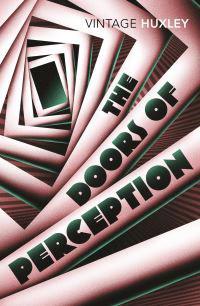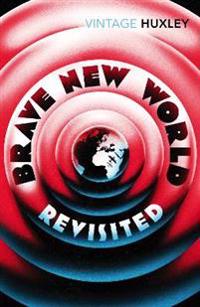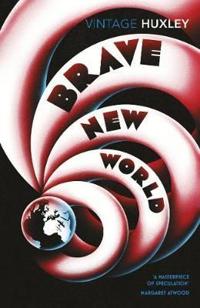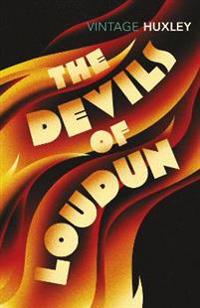Aldous Huxley Complete Essays (Inbunden)
avAldous Huxley
ISBN: 9781566633949 - UTGIVEN: 200111In this fourth volume of a projected six, Huxley registers his deep misgivings about the course of history in the late 1930s as the world moved toward a second global war. Many of his essays reflect his continuing interest in the conventions of popular culture as well as the philosophy of science an[...]
Selected Letters of Aldous Huxley (Inbunden)
avAldous Huxley
ISBN: 9781566636292 - UTGIVEN: 200710Of the ten thousand letters that Aldous Huxley wrote, only a fraction have been published. Those that were once considered too sensitive for publication can now be included in a wholly new collection. James Sexton's thoughtful selection opens new perspectives on one of the giants of prose. Huxley's [...]
Brave New World and Brave New World Revisited (Inbunden)
avAldous Huxley, Christopher Hitchens
ISBN: 9780060535261 - UTGIVEN: 200406The astonishing novel Brave New World, originally published in 1932, presents Aldous Huxley's vision of the future -- of a world utterly transformed. Through the most efficient scientific and psychological engineering, people are genetically designed to be passive and therefore consistently useful t[...]
Brave New World and Brave New World Revisited (Häftad)
avAldous Huxley
ISBN: 9780060776091 - UTGIVEN: 200507The astonishing novel Brave New World, originally published in 1932, presents Aldous Huxley's vision of the future -- of a world utterly transformed. Through the most efficient scientific and psychological engineering, people are genetically designed to be passive and therefore consistently useful t[...]
Brave New World (Häftad)
avAldous Huxley
ISBN: 9780060850524 - UTGIVEN: 200610First published in 1932, the classic, prophetic novel capturing the socialized horrors of a futuristic utopia remarkably explores the now-timely themes of cloning, individual creativity and freedom, and the role of science, technology, and drugs in humankind's future. Reprint. 25,000 first printing.[...]
Brave New World Revisited (Häftad)
avAldous Huxley
ISBN: 9780060898526 - UTGIVEN: 200609Written thirty years after his classic novel of the future, Brave New World, this thought-provoking sequel describes the shocking scientific devices and techniques available to any group in a position to manipulate society. Reprint. 25,000 first printing.[...]
Island (Häftad)
avAldous Huxley
ISBN: 9780061561795 - UTGIVEN: 200910In his final novel, which he considered his most important, Aldous Huxley transports us to the remote Pacific island of Pala, where an ideal society has flourished for 120 years. Inevitably, this island of bliss attracts the envy and enmity of the surrounding world. A conspiracy is underway to take [...]
Eyeless in Gaza (Häftad)
avAldous Huxley, David King Dunaway
ISBN: 9780061724893 - UTGIVEN: 200910Written at the height of his powers immediately after Brave New World, Aldous Huxley's highly acclaimed Eyeless in Gaza is his most personal novel. Huxley's bold, nontraditional narrative tells the loosely autobiographical story of Anthony Beavis, a cynical libertine Oxford graduate who comes of age[...]
The Genius and the Goddess (Häftad)
avAldous Huxley
ISBN: 9780061724909 - UTGIVEN: 200910Thirty years ago, ecstasy and torment took hold of John Rivers, shocking him out of "half-baked imbecility into something more nearly resembling the human form." He had an affair with the wife of his mentor, Henry Maartens--a pathbreaking physicist, winner of the Nobel Prize, and a figure of blindin[...]
The Devils of Loudun (Häftad)
avAldous Huxley
ISBN: 9780061724916 - UTGIVEN: 200907Aldous Huxley's acclaimed and gripping account of one of the strangest occurrences in historyIn 1643 an entire convent in the small French village of Loudun was apparently possessed by the devil. After a sensational and celebrated trial, the convent's charismatic priest Urban Grandier--accused of sp[...]
The Perennial Philosophy (Häftad)
avAldous Huxley
ISBN: 9780061724947 - UTGIVEN: 200907An inspired gathering of religious writings that reveals the "divine reality" common to all faiths, collected by Aldous Huxley"The Perennial Philosophy," Aldous Huxley writes, "may be found among the traditional lore of peoples in every region of the world, and in its fully developed forms it has a [...]
The Doors of Perception & Heaven and Hell (Häftad)
avAldous Huxley
ISBN: 9780061729072 - UTGIVEN: 200907Half an hour after swallowing the drug I became aware of a slow dance of golden lights . . . Among the most profound explorations of the effects of mind-expanding drugs ever written, here are two complete classic books--The Doors of Perception and Heaven and Hell--in which Aldous Huxley, author of [...]
Brave New World: With the Essay "Brave New World Revisited" (Häftad)
avAldous Huxley, Christopher Hitchens
ISBN: 9780061767647 - UTGIVEN: 201001The astonishing novel Brave New World, originally published in 1932, presents Aldous Huxley's legendary vision of a world of tomorrow utterly transformed. In Huxley's darkly satiric yet chillingly prescient imagining of a "utopian" future, humans are genetically designed and pharmaceutically anesthe[...]
The Divine Within: Selected Writings on Enlightenment (Häftad)
avAldous Huxley, Jacqueline Hazard Bridgeman, Huston Smith
ISBN: 9780062236814 - UTGIVEN: 2013-07Brave New World author Aldous Huxley on enlightenment and the "ultimate reality"In this anthology of twenty-six essays and other writings, Huxley discusses the nature of God, enlightenment, being, good and evil, religion, eternity, and the divine. Huxley consistently examined the spiritual basis of [...]
Eyeless in Gaza (Häftad)
avAldous Huxley
ISBN: 9780099458173 - UTGIVEN: 2004-07Anthony Beavis is a man inclined to recoil from life. His past is haunted by the death of his friend Brian and by his entanglement with the cynical and manipulative Mary Amberley. Realising that his determined detachment from the world has been motivated not by intellectual honesty but by moral cowa[...]
Antic Hay (Häftad)
avAldous Huxley
ISBN: 9780099458180 - UTGIVEN: 200409When Theodore Gumbril hits upon the notion of designing a type of pneumatic trouser to ease the discomfort of a sedentary life, he decides the time has come to leave his position as housemaster in a boys' public school and seek his fortune in the metropolis.[...]
Point Counter Point (Häftad)
avAldous Huxley
ISBN: 9780099458197 - UTGIVEN: 200407Marjorie has left her family to live with Walter; Walter is in love with the luscious but cold-hearted Lucy who devours every man in sight; the repulsive Spandrell deflowers young girls for the sake of entertainment and all the while everyone is engaged in dazzling and witty conversation.[...]
Doors of Perception (Häftad)
avAldous Huxley
ISBN: 9780099458203 - UTGIVEN: 200409In 1953, in the presence of an investigator, Aldous Huxley took four-tenths of a gramme of mescalin, sat down and waited to see what would happen. When he opened his eyes everything was transformed. Huxley described his experience in this book and its sequel "Heaven and Hell".[...]
Brave New World Revisited (Häftad)
avAldous Huxley
ISBN: 9780099458234 - UTGIVEN: 200409Includes the author's views on overpopulation, propaganda, advertising and government control. This book appeals for the defence of relevant individualism.[...]
Crome Yellow (Häftad)
avAldous Huxley
ISBN: 9780099461890 - UTGIVEN: 200402Denis Stone, a naive young poet, is invited to stay at Crome, a country house renowned for its gatherings of bright young things. Crome's hosts, Henry Wimbush and his exotic wife Priscilla are joined by a party of colourful guests whose intrigues and opinions make Denis's stay is a memorable one.[...]
Brave New World (Häftad)
avAldous Huxley
ISBN: 9780099477464 - UTGIVEN: 200409Romanen skildrer en velorganisert fremtidsverden hvor teknologien har sørget for et problemfritt liv. Alle mennesker - nesten - er lykkelige og sorgløse. At lykken ikke er fullkommen skyldes en liten gruppe mennesker som er annerledes enn de "vanlige" fabrikkproduserte. Mellom disse avvikerne og d[...]
Devils of Loudon (Häftad)
avAldous Huxley
ISBN: 9780099477761 - UTGIVEN: 200504In 1634 Urbain Grandier, a handsome and dissolute priest of the parish of Loudun was tried, tortured and burnt at the stake. He had been found guilty of conspiring with the devil to seduce an entire convent of nuns in what was the most sensational case of mass possession and sexual hysteria in histo[...]

